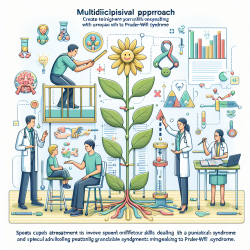Introduction
In the field of speech-language pathology, understanding the broader context of a child's life can be crucial for effective intervention. Recent research, such as the study titled "Association between childhood adversities and premature and potentially avoidable mortality in adulthood: a population-based study," highlights the profound impact that early life experiences can have on long-term health outcomes. This blog explores how practitioners can leverage these insights to improve therapeutic outcomes and encourages further research into this critical area.
Key Findings from the Study
The study, conducted by Bhattarai et al., analyzed data from the National Population Health Survey linked to the Canadian Vital Statistics Database. It examined the relationship between specific childhood adversities—such as physical abuse and being sent away from home—and premature, potentially avoidable mortality (PPAM) in adulthood.
Key findings include:
- Physical abuse and being sent away from home were significantly associated with increased risk of PPAM, with age-adjusted sub-hazard ratios of 1.44 and 2.26, respectively.
- These associations were attenuated when adjusted for adulthood factors like smoking, poor perceived health, depression, low social support, and low income, suggesting possible mediating effects.
- Other adversities, such as parental divorce or substance abuse, were not significantly associated with PPAM.
Implications for Practitioners
For practitioners in speech-language pathology, these findings underscore the importance of considering a child's broader life context, including potential adversities, when designing interventions. Here are several ways to integrate these insights into practice:
- Holistic Assessment: Incorporate questions about family dynamics and past adversities into assessments to gain a comprehensive understanding of the child's background.
- Interdisciplinary Collaboration: Work closely with psychologists, social workers, and other professionals to address the multifaceted needs of children who have experienced adversities.
- Focus on Resilience: Develop strategies that build resilience and coping skills in children, potentially mitigating the long-term effects of early adversities.
Encouraging Further Research
While this study provides valuable insights, it also highlights the need for further research. Practitioners are encouraged to engage in or support studies that explore:
- The specific mechanisms through which childhood adversities affect adult health outcomes.
- Effective interventions that can mitigate the impact of these adversities.
- The role of protective factors and resilience in altering the trajectory from childhood adversity to adult health outcomes.
Conclusion
Understanding the link between childhood adversities and adult mortality can inform more effective interventions and support strategies in speech-language pathology. By integrating these insights into practice, practitioners can contribute to better long-term outcomes for children. For those interested in delving deeper into the research, the original study can be accessed here: Association between childhood adversities and premature and potentially avoidable mortality in adulthood: a population-based study.










